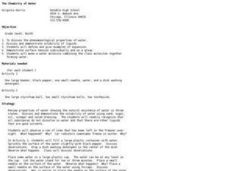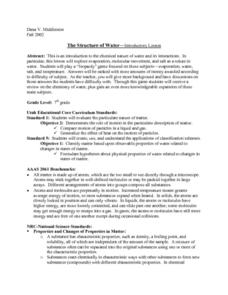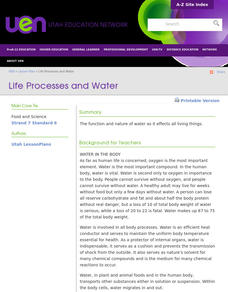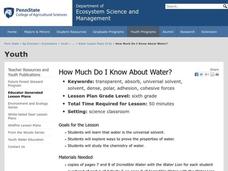Baylor College
What Makes Water Special?
Get close up and personal with a drop of water to discover how the polarity of its molecules affect its behavior. Elementary hydrologists split and combine water droplets, and also compare them to drops of oil. Much neater than placing a...
Curated OER
Student Reading - The Unique Properties of Water
Without water there would be no life on this planet. Biology learners find out why by reading this handout. Create a worksheet of questions to answer after the reading. Follow it up with quick demonstrations or laboratory activities that...
University of Georgia
What's So Special about Bottled Drinking Water?
Is artesian water designed to be better, or is it just from wells similar to those in the city of Artesium? This experiment looks at many different types of bottled waters, including artesian. Using a soap mixture, scholars test to see...
Curated OER
The Chemistry of Water
Students investigate the properties of water. In this chemistry of water lesson plan, students observe a demonstration of the properties of water using sand, sugar, oil, vinegar and salad dressing. Students experiment with water, pepper,...
American Chemical Society
Why Does Water Dissolve Salt?
Individuals explore solubility by modeling how water dissolves salts. They then view a video and compare how well water and alcohol dissolve salts, relating their comparisons to the structure of each molecule.
Curated OER
Walking Magic
Students conduct experiment with water striders by placing the insect in two different solutions and discuss their observations. They discover that weight and surface area are important factors in their experiment.
American Chemical Society
Why Does Water Dissolve Sugar?
Did you know that if you wait long enough, the M on the outside of an M and M will float to the surface when submerged in water? Learners observe the sugar coating of an M and M while it is dissolving in water. They explain how this...
SRI International
Science of Water
Water is crucial to survival. Scholars gain an appreciation for water by reading about it, learning about its atomic properties, and investigating its properties through six stations in a lab activity.
American Chemical Society
Surface Tension
A drop of dew holds a sphere shape even when sitting on a seat thanks to the surface tension of water. Learners observe the phenomena of surface tension in water. Through demonstrations, hands-on activities, and discussions they explore...
American Chemical Society
Can Liquids Dissolve in Water?
How does food coloring work? Classes watch a demonstration showing liquids dissolving in liquids. In groups, they then explore the ability of other liquids to dissolve in water (alcohol, mineral oil, and corn syrup) by setting up and...
American Chemical Society
Mysterious M&M's
The first in a six-lesson mini unit, all using M&Ms® candies, this physical science activity gets kids to observe a single piece and discover what happens when it is placed in a plate of water. The activity can be used to...
University of Washington
Using Modeling to Demonstrate Self-Assembly in Nanotechnology
Do polar opposites attract? After an introduction on the polarity of molecules, pupils are asked to design a self-assembling model using materials with different polarity. The challenge should motivate learners to develop a workable...
Curated OER
Properties of Water with a Splash of Color
Students explore the properties of water. In this cross curriculum art and physical science lesson, students experiment with a variety of materials to demonstrate the cohesive forces and adhesion of water. Students create a water color...
Curated OER
Molecular Forces at Work: Creating Soap Bubbles
Students investigate adhesion, cohesion and surface tension. In this molecular forces lesson plan, students observe multiple demonstrations that show surface tension, the attraction of water molecules to each other and the ability of...
Curated OER
Sea Water Freeze
Students observe how salinity affects the time it takes water to freeze. They participate in an experiment to determine that ice is essentially salt-free whether formed from fresh or salt water
Curated OER
Water Unit
Students make boats and race them. In this physics lesson, students investigate surface tension, molecules, and cohesion by competing in a class race with their boats. Students experiment with liquid soap to see how much will make their...
Curated OER
Physical and Chemical Properties of Water
Students experiment with water as a component of suspensions, solutions, and heat conduction contributing to the use of food and the health and wellness of human beings.
Curated OER
The Chemical Nature of Water
Seventh graders simulate a Jeopardy game to examine the chemical nature of water. Among the topics featured are evaporation, water, salt, and temperature. finally, as review, 7th graders answer a battery of questions presented by the...
Curated OER
How Much Do I Know About Water?
Sixth graders explore how water behaves on a penny. In this states of matter lesson, 6th graders observe water as they add drops to a penny. This lesson helps students apply the adhesive properties of water to the water cycle.
Curated OER
Life Processes and Water
Explain the properties of water. Identify the properties of water that make it a polar molecule Describe hydrogen bonds and how they differ from covalent bonds Discuss the differences between hard water and soft water Compare the heat of...
Curated OER
Take a Dip: Sticky Water
Students complete lab activities to investigate the "sticky" properties of water, such as surface tension and capillary action, due to the polarity of the molecules.
Curated OER
How Big is a Molecule?
Students estimate the size of a molecule of oleic acid. They conduct an experiment using chalk dust, water, and oleic acid, solve various calculations, and answer discussion questions.
Curated OER
Making "Cents" of Surface Tension
Students explore the unique behaviors of water. They investigate surface tension using water drops on a penny and pennies dropped in a cup.
Curated OER
How Much Do I Know About Water?
Sixth graders explore ways to analyze the properties of water and examine the chemistry of water. In this water lesson students work in groups and complete several activities.























